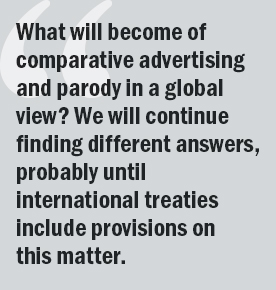INTA News
Comparative Advertising and Parodies
Published: May 15, 2020
Florencia Rosati Beccar Varela Buenos Aires, Argentina Copyright Committee - Fair Use Subcommittee
Ivon Hernandez Arias Guatemala City, Guatemala Copyright Committee - Fair Use Subcommittee
Juan Lapenne Fox & Lapenne Montevideo, Uruguay Copyright Committee - Fair Use Subcommittee
Nadav Applebaum Glazberg, Applebaum, & Co Haifa, Israel Copyright Committee - Fair Use Subcommittee
Rosita Li Mayer Brown Hong Kong SAR Copyright Committee - Fair Use Subcommittee
INTA’s Copyright Committee, Fair Use Subcommittee, prepared an international chart reflecting how comparative advertising and parody may be considered to affect trademarks and copyrighted works in different jurisdictions, further resulting in whether or not they are considered an intellectual property infringement. The investigated jurisdictions were:
| Argentina | Australia | Belgium |
| Canada | China | Estonia |
| European Union | France | Guatemala |
| Hong Kong SAR, China | Israel | Italy |
| Latvia | Lithuania | Netherlands |
| New Zealand | Singapore | USA |
| Uruguay |
For purposes of this study, comparative advertising may be defined as a marketing technique that compares one’s own goods or services, or certain features of such goods or services, with those of an identified or identifiable competitor. Countries may go from being strong supporters of comparative advertising to accepting comparative advertising subject to certain rules.
Likewise, parody may be defined as a work that humorously, ironically, or sarcastically imitates another work. Parodies may be found in paintings and in literature. They may also be found in films and in music. Ultimately, parodies can be found in different art or cultural expressions, and are very common in politics.
 In some jurisdictions, for example in the United States, parody constitutes “fair use,” and hence is a defense to copyright and trademark infringement. To qualify as a “parody,” a parody must convey two simultaneous, but contradictory, messages: that it is the original; and that it is not the original and is instead a parody.
In some jurisdictions, for example in the United States, parody constitutes “fair use,” and hence is a defense to copyright and trademark infringement. To qualify as a “parody,” a parody must convey two simultaneous, but contradictory, messages: that it is the original; and that it is not the original and is instead a parody.
On the other hand, there are jurisdictions that do not have provisions concerning so-called “fair use,” for example the European Union. However, there is some guidance in the recitals 18 and 27 of the Directive (EU) 2015/2436 and 21 of the Regulation (EU) 2017/1001. In addition, Directive 84/450/EEC as amended by Directive 97/55/EC lays down the conditions for comparative advertising. Regarding parodies, Directive 2001/29/EC on the Harmonization of Certain Aspects of Copyright and Related Rights in the Information Society (Copyright Directive) does not grant global fair use exception to copyright. However, Article 5.3 of the Copyright Directive lists exceptions to the author’s “reproduction right” and “right of communication to the public.”
Also, there are some jurisdictions that follow a narrow, highly prescriptive “fair dealing” exception—one of which is New Zealand—that have this kind of exception for copyright infringement, but parody does not constitute an exception and hence, a “parody” of a copyrighted work would constitute a copyright infringement. However, in New Zealand there is an exception to trademark infringement for comparative advertising. Another country that has a narrow, highly prescriptive “fair dealing” exception for copyright infringement is Singapore. Regarding trademark infringement, Singapore does have an exception for comparative advertising.
There is also the case of Hong Kong SAR, China, that has a “fair dealing” exception to copyright infringement, but unlike in some other common law jurisdictions, parody does not fall under the “fair dealing” exception in this country. Hong Kong also has an exception to trademark infringement for comparative advertising which is similar to the “fair dealing” exception for copyright infringement. The test in Hong Kong is surprisingly “fair use‒like” and is based on references to “honest practices,” “unfair advantage,” and “detrimental to the distinctive character or repute.”
Practitioners can conclude that each of us may find answers in our own jurisdictions, but that hardly seems enough. The world of trademarks and copyright is a global world: Merchandise crosses borders; ads are broadcasted globally; and the same brands are known in many countries. And what about the Internet and its disregard for physical and geo-political borders? What will become of comparative advertising and parody, in a global view? We will continue finding different answers to this question, probably until international treaties include provisions on this matter.
The chart, available here, is part of the Subcommittee’s ongoing efforts to gather information and document how fair use is treated in different jurisdictions for the assessment of comparative advertising and parody disputes.
Although every effort has been made to verify the accuracy of items in the INTA Bulletin, readers are urged to check independently on matters of specific concern or interest.
© 2020 International Trademark Association